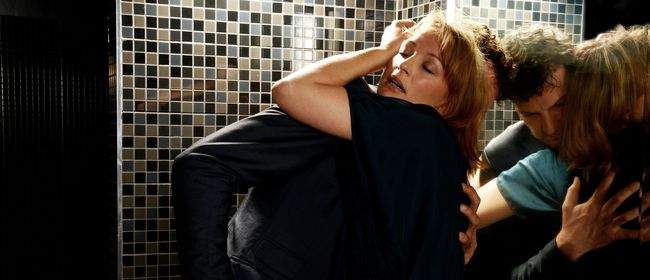Speaking in Tongues
Lots of plays try to tackle the big question of what makes us human but few are as thought-provoking or emotionally satisfying as Speaking in Tongues.
Overview
The Silo production of Speaking in Tongues, based on the play by Australian writer Andrew Bovell is an engrossing psychological thriller about the destructive powers of love and desire. It questions not only who we are in relation to others but how the past can hold power over the present.
Four seasoned actors make it look easy to play nine characters. Multiple storylines develop. Some intersect while others come to an abrupt end. Each narrative seems to encourage the audience to pick a side. Nobody is perfect but who do you relate to, sympathise with or think has the moral high ground? It starts in a bar where two nervous couples hook up. They are all married but they are searching for the missing piece. It's not as simple as having fallen out of love with their spouses. The infidelity has consequences. Both decide to 'take a break' and are left to ponder why they strayed.
The most poignant scenario involves a jilted lover ( Oliver Driver) whose hold on the past has all but consumed him. He knew love once, or at least that's what he calls it. When his girlfriend (Luanne Gordon) went on her OE they wrote letters. She promised to marry him but then vanished. Years later he sees her on the bus and the stalking begins. When he finally works up the courage to confront her she barely recognises him. Her side of the story differs wildly. The way they relate speaks volumes about them as people.
Stephen Lovatt plays two men who, by chance, end up on opposite sides of the law. One just wants to be noticed by his wife; the other has a loving wife but goes looking for more. Alison Bruce is especially memorable in her portrayal of Valerie, a therapist with plenty of her own baggage. She displays two startling moments of paranoia. In one she is adrenalin-fuelled and running from a perceived threat, in the other she launches a tirade of abuse at a man on the street who she says looks at her funny.
The really striking thing about Speaking in Tongues is that although it's very dialogue heavy it doesn't seem it. Stories which we hear second-hand are carefully crafted to create crystal-clear images. The alientation between the characters is intensified by the clever lighting and set design. John Verryt's use of mirrors creates a division across the stage and Sean Lynch uses reflections to make characters appear close yet not quite close enough to connect in any real way.
Lots of plays try to tackle the big question of what makes us human but few are as thought-provoking or emotionally satisfying as Speaking in Tongues.





